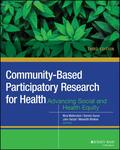Community-Based Participatory Research for Health
Advancing Social and Health Equity

3. Edition December 2017
480 Pages, Softcover
Wiley & Sons Ltd
The definitive guide to CBPR concepts and practice, updated and expanded
Community-Based Participatory Research for Health: Advancing Health and Social Equity provides a comprehensive reference for this rapidly growing field in participatory and community-engaged research. Hailed as effective by the Centers for Disease Control and Prevention, CBPR and CEnR represent the link between researchers and community and lead to improved public health outcomes.
This book provides practitioner-focused guidance on CBPR and CEnR to help public health professionals, students, and practitioners from multiple other clinical, planning, education, social work, and social science fields to successfully work towards social and health equity.
With a majority of new chapters, the book provides a thorough overview of CBPR history, theories of action and participatory research, emerging trends of knowledge democracy, and promising practices. Drawn from a ten-year research effort, this new material is organized around the CBPR Conceptual Model, illustrating the importance of social context, promising partnering practices, and the added value of community and other stakeholder engagement for intervention development and research design. Partnership evaluation, measures, and outcomes are highlighted, with a revised section on policy outcomes, including global health case studies.
For the first time, this updated edition also includes access to the companion website, featuring lecture slides of conceptual and partnership evaluation-focused chapters, with resources from appendices to help bring CBPR concepts and practices directly into the classroom.
Proven effective year after year, CBPR has become a critically important framework for public health, and this book provides clear reference for all aspects of the practice. Readers will:
* Examine the latest research on CPBR, and incorporate new insights into practice
* Understand the history and theoretical basis of CPBR, and why it has been so effective
* Reflect on critical issues of racism, power, and privilege; trust development; ethical practice within and beyond IRBs; and cultural humility
* Learn new partnership evaluation and collective reflection strategies, including measures and metrics, to enhance their own practice for improved health and social equity outcomes
The new, third edition builds on the excellence of the previous edition with an emphasis on social and health equity as the ultimate concerns of collaborative inquiry. The third edition has substantial changes from the previous edition that provide updated knowledge and developments in CBPR. Through lessons learned from liberal use of case studies, this work serves to broaden our understanding of the potential of this approach to engage in collaborative, transformative work, focused on equity. - Michele A. Kelley, MSW, MA, University of Illinois at Chicago
The new edition of Community-Based Participatory Research for Health by Nina Wallerstein and colleagues (2018) is an extremely valuable resource for a wide variety of stakeholders interested in collaborative work to promote health equity. This updated collection succinctly delineates the theory, history, principles, and practices of community-based participatory research (CBPR) to help the reader understand CBPR as an approach, a philosophy, and an ethic. This updated edition will serve as a helpful resource for those interested in incorporating CBPR principles and approaches into their work. The chapters are authored by leaders and innovators in CBPR who provide insights, share experiences, and describe case studies that expand our ability to understand and envision the transformative power of CBPR in practice... Updates to this edition align with critical dialogues about positionality, privilege, and power in a way that encourages healthy self-reflection. This volume will undoubtedly follow earlier editions to become a must-read classic for health promotion practicioners interested in advancing health and social equity. - Janet Page-Reeves, Ph.D.
Bonnie Duran, DrPH, is a Professor in the School of Social Work at the University of Washington, and is also Director of the Center for Indigenous Health Research at the Indigenous Wellness Research Institute.
John G. Oetzel, PhD, is a Professor in the Department of Management Communication in the Waikato Management School at the University of Waikato in Hamilton, New Zealand.
Meredith Minkler, DrPH, is Professor Emerita of Health and Social Behavior in the School of Public Health, University of California, Berkeley.


